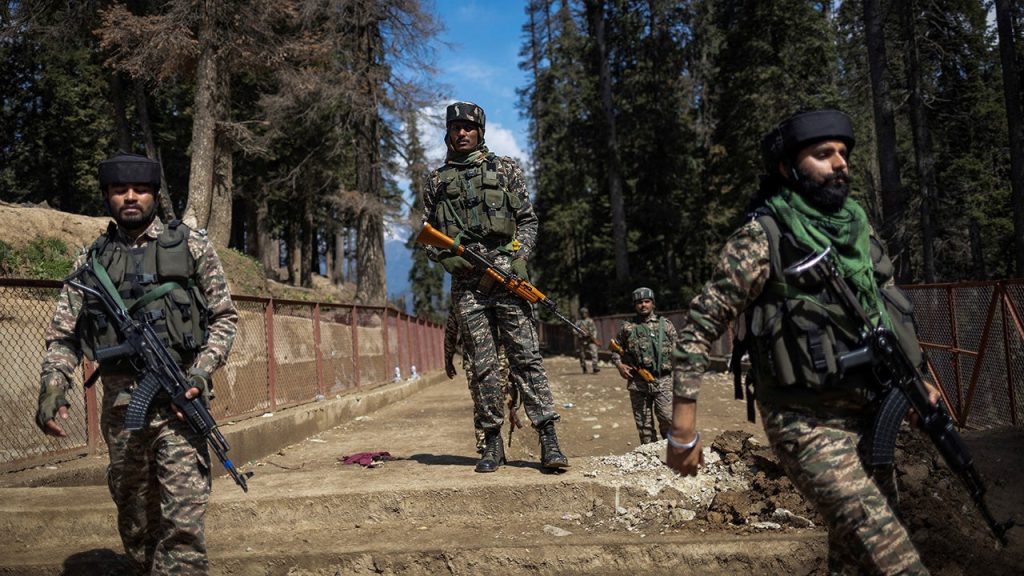Tensions between India and Pakistan have escalated significantly following a deadly militant attack in Kashmir that resulted in the deaths of 26 people. Pakistan’s Defense Minister expressed concerns over an imminent incursion from India, aligning with India’s aggressive military and diplomatic responses. As both nations bolster their military readiness, the international community is closely monitoring the developments, which hark back to longstanding territorial disputes stemming from the partition of British India.
| Article Subheadings |
|---|
| 1) Rising Tensions After Kashmir Attack |
| 2) India’s Response to the Attack |
| 3) Historical Context of India-Pakistan Relations |
| 4) International Reactions to the Escalation |
| 5) Future Implications for Regional Stability |
Rising Tensions After Kashmir Attack
Following a brazen militant attack in Kashmir, which left 26 individuals dead, tensions between India and Pakistan have risen sharply. The attack, attributed to militants believed to be backed by Pakistan, has resulted in an aggressive military and law enforcement response from India. Pakistan’s Defense Minister, Khawaja Muhammad Asif, claimed on Monday that an Indian incursion into Pakistani territory is very likely, a viewpoint that has amplified regional anxieties and prompted both nations to fortify their military positions along the Line of Control (LoC).
Witnesses describe the atmosphere in Kashmir as tense, with apprehensive civilians caught in the crossfire of escalating hostilities and military readiness. The exchange of gunfire across the borders has intensified since the attack, raising fears of broader conflict.
India’s Response to the Attack
In the aftermath of the Kashmir attack, Indian authorities initiated an intensive campaign to root out the attackers and their supporters. Reportedly, measures included demolishing properties associated with suspected militants, along with widespread detentions exceeding 1,500 individuals for questioning. Additionally, Indian security forces have reinforced their personnel in conflict-prone areas to prevent further escalation.
Indian Prime Minister Narendra Modi has taken a diplomatic approach as well, engaging with global leaders to enlist support and to delineate India’s position that Pakistan has a significant role in facilitating such militant activities. This diplomatic outreach underscores the seriousness with which India considers the threat, as it prepares for various scenarios in the region.
Historical Context of India-Pakistan Relations
The roots of the conflict between India and Pakistan date back nearly eight decades, originating from the precarious partition of British India in 1947. This partition created two independent states, India and Pakistan, leading to massive communal violence and displacement along religious lines. The princely state of Jammu and Kashmir became a flashpoint for conflict, with ongoing disputes over its territorial status.
The Maharaja of Kashmir initially sought to remain independent but ultimately chose to accede to India in exchange for military assistance against invading Pakistani forces. This decision has left a lingering sense of grievance that fuels tensions today, as both countries claim the region as their own.
International Reactions to the Escalation
The international community is keeping a vigilant eye on the developments following the Kashmir attack. U.S. officials have reiterated their commitment to encouraging both nations to seek a peaceful resolution to their longstanding disputes. The U.S. State Department highlighted the need for a “responsible solution,” aiming to steer the nations away from escalating military confrontations.
Countries in the Gulf region have also been informed of the situation by Pakistan, indicating a potential international diplomatic engagement may be underway aimed at defusing tensions. China’s involvement is noteworthy, given its strategic alliance with Pakistan, and the potential implications for cross-border relations in South Asia.
Future Implications for Regional Stability
The current situation poses potential threats to peace and stability in the region. As both countries engage in military reviews and adjustments, the risk of miscalculations leading to a larger confrontation increases. Analysts warn that if hostilities continue to escalate, it could lead to broader military actions or a further deterioration of diplomatic relations.
Moreover, the humanitarian situation in Kashmir could worsen, exacerbated by military actions and ongoing civil unrest. As tensions intensify, civilians in the region are caught in a precarious situation, with fears of violence and reprisals affecting their day-to-day lives.
| No. | Key Points |
|---|---|
| 1 | Tensions between India and Pakistan have escalated significantly following a militant attack in Kashmir. |
| 2 | India is actively pursuing perpetrators of the attack, implementing strict military and law enforcement measures. |
| 3 | The historical context of the India-Pakistan conflict remains central to understanding current tensions. |
| 4 | International responses highlight the necessity for both nations to seek peaceful resolutions. |
| 5 | Continued escalation poses risks for regional stability and humanitarian conditions in Kashmir. |
Summary
The recent escalation in tensions between India and Pakistan following the Kashmir attack underscores the fragile stability in the region. As both nations ramp up military readiness and engage in strategic diplomatic outreach, the potential for a larger conflict looms. Understanding the historical context and the international response will be crucial in navigating this complex geopolitical landscape.
Frequently Asked Questions
Question: What prompted the recent escalation in India-Pakistan tensions?
The recent militant attack in Kashmir, which resulted in the deaths of 26 people, has significantly escalated tensions between India and Pakistan, with both sides engaging in military readiness and diplomatic maneuvers.
Question: How is India responding to the militant attack?
India is conducting an aggressive search for the militants involved in the attack, detaining over 1,500 individuals for questioning and demolishing properties linked to suspects.
Question: Why is the Kashmir region a point of contention for India and Pakistan?
Kashmir’s status has been disputed since the 1947 partition of British India, and both countries claim it as their territory. This lingering dispute has led to multiple wars and ongoing military confrontations.


